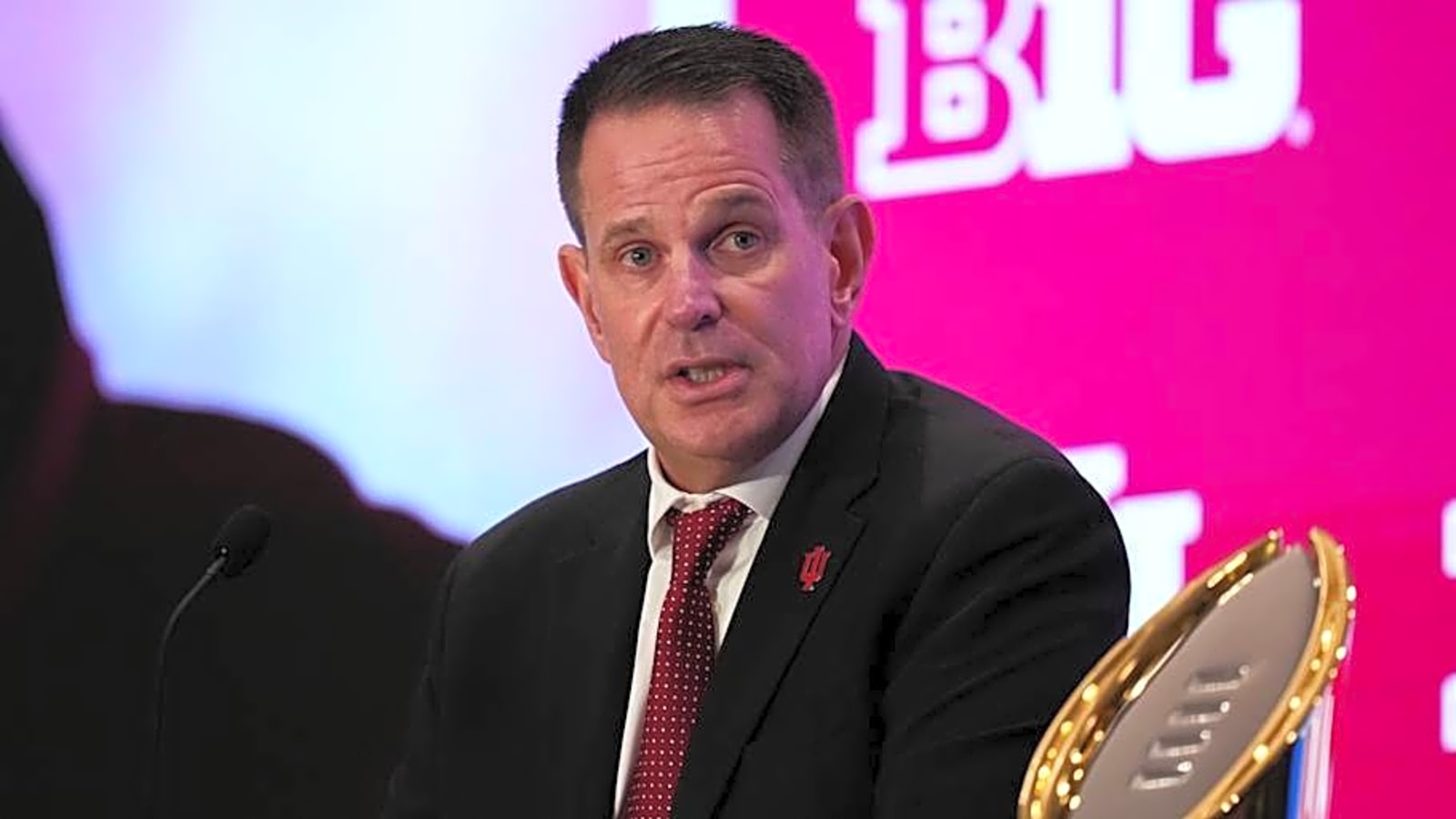
LAS VEGAS — Indiana football head coach Curt Cignetti defended the Hoosiers’ softened approach to non-conference scheduling while simultaneously setting the south ablaze Tuesday at Big Ten Media Day in Las Vegas.
When he was asked about Indiana’s decision to cancel a future home-and-series series with Virginia, Cignetti said the Hoosiers are merely playing the same mathematical game as the SEC.
“Look, here's the bottom line: We picked up an extra home game, and we play nine conference games,” Cignetti said. “The two best conferences in college football, any football guy that's objective will tell you is the Big Ten and the SEC. Twelve of the 16 SEC teams play three G5 or an FCS game. 12 of those teams play 36 games, 29 G5 games and seven FCS games, and one less conference game.
“So we figured we would just adopt SEC scheduling philosophy.”
Cignetti said the Hoosiers’ philosophy began before he was hired Nov. 30, 2023, but he signed off on it during the offseason leading into his first season.
In addition to Virginia, Indiana has canceled non-conference games with UConn and the University of Louisville. The Hoosiers’ focus is on their nine Big Ten games, Cignetti said, and best positioning themselves for a run at the College Football Playoff.
And despite Indiana having no Power 4 non-conference opponents scheduled through 2020, Cignetti isn’t taking high-leverage non-conference games off the table.
“We wouldn't be opposed to Big Ten-SEC regular season games every year,” Cignetti said. “We need to standardize the schedule across the board if we want to have objective criteria for who should be in the playoffs and who shouldn't, and we need to take the decision-making off the committee to some degree.”
Cignetti added the Hoosiers are monitoring the landscape of the College Football Playoff format and are flexible to changing their strategy if needed. He supports the four-four automatic qualifier option, which guarantees four bids apiece to the Big Ten and SEC. He cited Ohio State finishing fourth in the Big Ten last season and proceeding to win the national title as proof for his point.
Within the four-four automatic qualifier argument is a play-in to earn the bids. To settle the final two spots, Cignetti wants the conference’s No. 3 team to play No. 6 and No. 4 to play No. 5 on championship weekend. He also wants every conference to play nine league games — the Big Ten and Big 12 play nine, but the SEC and ACC play eight.
That, Cignetti said, helps reduce concerns over strength of schedule and rewards the teams in the most competitive conferences. In Cignetti’s four-four automatic qualifier format, the ACC and Big 12 would get two guaranteed bids and the Group of 5 would get one automatic spot. There would be three spots open for at-large bids while the College Football Playoff would expand from 12 to 16 teams.
The SEC is the primary roadblock to executing Cignetti and the Big Ten’s plan, instead preferring a five-to-11 concept where the highest-ranked conference champions secure audio bids.
Big Ten commissioner Tony Petitti said the SEC and Big Ten have control over changes to the College Football Playoff format, and Petitti’s stance mirrors Cignetti’s.
“We want to better connect the regular season and the post-season,” Petitti said Tuesday. “A critical goal of any post-season format, regardless of sport, is to keep as many teams alive as deep into the season as possible. We want more conference games to matter in November.
“Also, the playoff format should not function as a disincentive to schedule tough, nonconference games. As we said throughout this process, we are open to considering any format ideas that come from our colleagues or the CFP staff, but to be clear, formats that increase the discretion and role of the CFP Selection Committee will have a difficult time getting support from the Big Ten.”
Petitti doubled-down on his stance regarding his preference for competitive non-conference games, which spars with Indiana’s approach but underscores that the Hoosiers are merely scheduling in a manner that’s beneficial to the current format.
It’s smart yet contradictory — and has potential to change any way the sport’s landscape blows.
“We’ll see where we are,” Cignetti said, “because there are a lot of issues still in a lot of areas.”
More must-reads:
- Sherrone Moore says Michigan will do away with controversial celebration
- Mike Norvell reveals Gus Malzahn's strength as Florida State's new offensive coordinator
- The 'Multiple 100-RBI MLB seasons' quiz
Breaking News
Trending News
Customize Your Newsletter
 +
+
Get the latest news and rumors, customized to your favorite sports and teams. Emailed daily. Always free!








